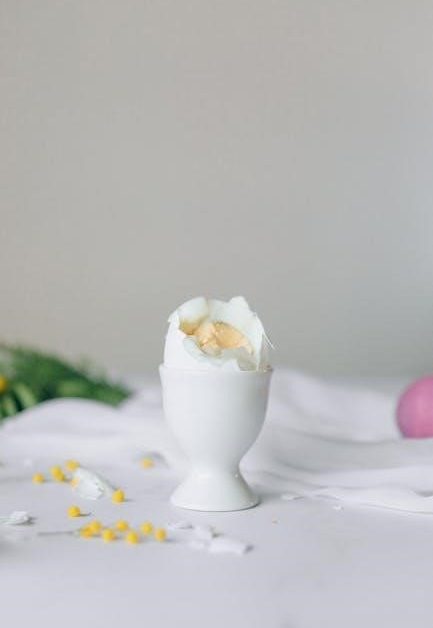Hard-boiled eggs are a simple yet versatile snack, offering a convenient source of protein. They are cooked until both the yolk and white are fully set, making them a great addition to various meals. Their popularity stems from their ease of preparation and long shelf life, perfect for meal prep or on-the-go nutrition. Hard-boiled eggs are also a cornerstone in many cuisines, appearing in dishes like salads, sandwiches, and dips. With minimal ingredients required, they are a cost-effective and healthy option for any lifestyle.
What Are Hard-Boiled Eggs?
Hard-boiled eggs are eggs cooked in their shells with fully set whites and yolks. They are boiled in water until the yolks reach desired doneness, typically firm and fully cooked. This method ensures the eggs are safe to eat and convenient to store. The process involves submerging eggs in water, bringing to a boil, then letting them sit. The result is a versatile, nutritious snack or ingredient, perfect for salads, sandwiches, or on their own. Hard-boiled eggs are a staple in many cuisines due to their simplicity and long shelf life.
Why People Love Hard-Boiled Eggs
Hard-boiled eggs are adored for their convenience, versatility, and nutritional value. They provide a quick protein-packed snack, perfect for busy lifestyles. The process of cooking them is straightforward, requiring minimal effort. Additionally, they can be easily incorporated into various recipes, from classic deviled eggs to hearty salads. Their long shelf life makes them ideal for meal prep. The simplicity of preparation and the satisfaction of a perfectly cooked egg contribute to their widespread popularity, making them a beloved choice for many around the world. They are also a cost-effective and healthy option for any meal.
The Versatility of Hard-Boiled Eggs
Hard-boiled eggs are incredibly versatile, fitting seamlessly into various dishes and dietary preferences. They can be enjoyed as a simple snack, sliced into sandwiches, or added to salads like cobbs or niçoise. For a quick breakfast, they pair perfectly with toast or avocado. In international cuisine, they feature in dishes such as Japanese ramen, Indian curries, and Middle Eastern shakshuka. Their firm texture makes them ideal for deviling or pickling, while their mild flavor allows them to complement a wide range of seasonings. This adaptability ensures they remain a staple in kitchens worldwide, offering endless possibilities for creativity and nourishment.
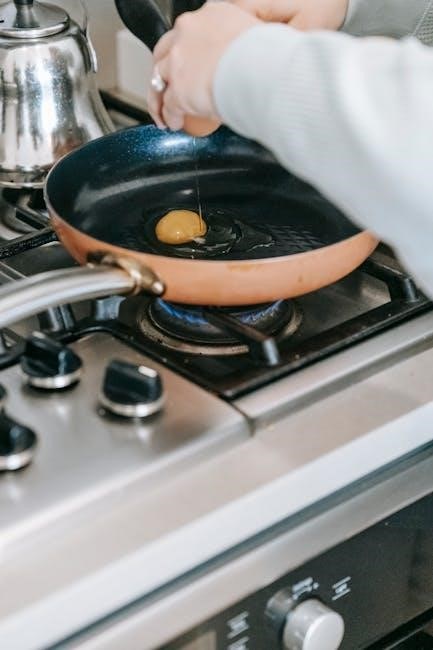
Traditional Stovetop Method
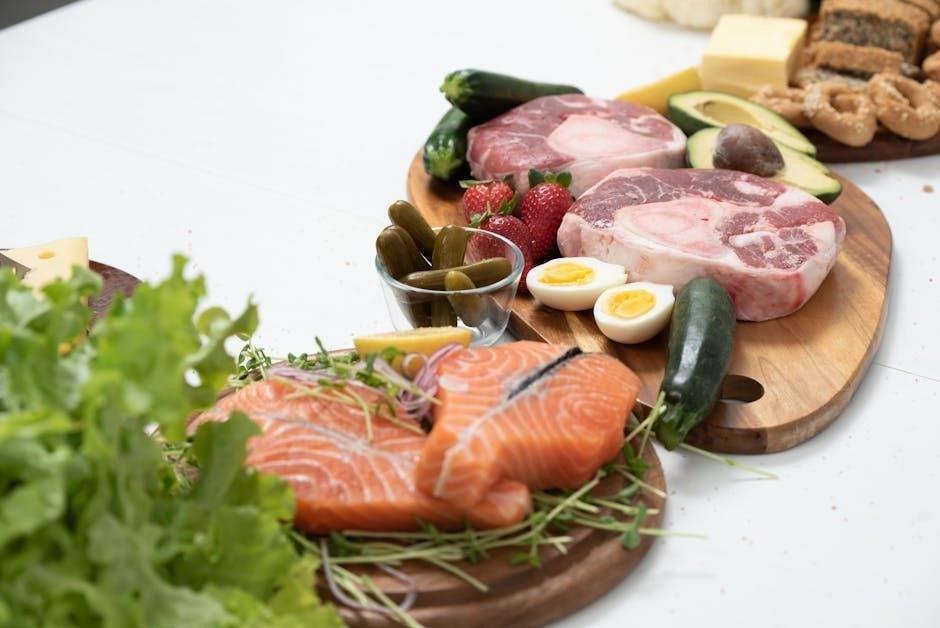
Place eggs in a saucepan, cover with cold water, and bring to a boil. Cover, remove from heat, and let stand for 12 minutes for fully cooked eggs.
Step 1: Placing Eggs in the Saucepan
Gently place the eggs in a single layer at the bottom of a medium-sized saucepan. Ensure the eggs are not overcrowded, as this may cause cracking. Place the saucepan on a stable surface and arrange the eggs carefully to avoid any movement or collision. This step ensures even cooking and prevents potential breakage during the boiling process. Proper placement is essential for achieving perfectly cooked hard-boiled eggs without any damage or uneven cooking. Once the eggs are arranged neatly, you can proceed to the next step of adding water.
Step 2: Adding Cold Water
Pour cold water into the saucepan, ensuring the eggs are fully submerged. Add enough water to cover the eggs by about 1 inch. This step is crucial for even cooking and prevents the eggs from cracking due to rapid temperature changes. For better results, you can add a teaspoon of vinegar or salt to the water, which helps with peeling. The water level should be adequate to cover the eggs completely but not excessively, as this can lead to splashing during boiling. Always use cold water to start, as it helps the eggs cook more gently and reduces the risk of cracking. Once the water is added, the saucepan is ready for heating.
Step 3: Bringing to a Boil
Place the saucepan over high heat and bring the water to a rolling boil. Once the water reaches a vigorous boil, you’ll notice large bubbles rising rapidly to the surface. At this stage, the eggs are being exposed to the highest temperature, which is essential for cooking the eggs evenly. Avoid letting the water boil too aggressively, as this could cause the eggs to bump into each other and crack. Maintain the boil for about 30 seconds to ensure the cooking process begins effectively before moving to the next step. This step sets the foundation for perfectly cooked eggs. Always monitor the heat to prevent overheating. The boiling phase is crucial for initiating the cooking process and ensuring the eggs are properly set. Once the water is boiling steadily, it’s time to reduce the heat or cover the pan, depending on your preferred method. The key is to achieve a consistent boil to cook the eggs thoroughly and avoid undercooking. By carefully controlling the heat, you can ensure the eggs cook evenly and safely. This step is vital for achieving the desired texture in both the whites and yolks. Proper boiling ensures the eggs are cooked consistently, making them easier to peel and more enjoyable to eat. Always keep an eye on the water level to prevent it from boiling over. The boiling process should be steady but not overly vigorous, as this can cause the eggs to crack. Once the water is boiling, the next step is to adjust the heat or cover the pan to allow the eggs to cook fully. This ensures the eggs are exposed to the right amount of heat for the desired doneness. The boiling phase is the cornerstone of the cooking process, setting the stage for perfectly cooked hard-boiled eggs. Always prioritize even heating during this step to achieve the best results. The boiling process should be carefully managed to ensure the eggs cook consistently without damage. This step is essential for achieving the perfect texture and preventing cracks. By maintaining a steady boil, you ensure the eggs are cooked thoroughly and safely. Always monitor the heat to keep the water at the right temperature for even cooking. The boiling phase is critical for initiating the cooking process and ensuring the eggs are properly set. Proper boiling ensures the eggs are cooked evenly, making them easier to peel and more enjoyable to eat. Always keep an eye on the water level to prevent it from boiling over. The boiling process should be steady but not overly vigorous, as this can cause the eggs to crack. Once the water is boiling, the next step is to adjust the heat or cover the pan to allow the eggs to cook fully. This ensures the eggs are exposed to the right amount of heat for the desired doneness. The boiling phase is the cornerstone of the cooking process, setting the stage for perfectly cooked hard-boiled eggs. Always prioritize even heating during this step to achieve the best results. The boiling process should be carefully managed to ensure the eggs cook consistently without damage. This step is essential for achieving the perfect texture and preventing cracks. By maintaining a steady boil, you ensure the eggs are cooked thoroughly and safely. Always monitor the heat to keep the water at the right temperature for even cooking. The boiling phase is critical for initiating the cooking process and ensuring the eggs are properly set. Proper boiling ensures the eggs are cooked evenly, making them easier to peel and more enjoyable to eat. Always keep an eye on the water level to prevent it from boiling over. The boiling process should be steady but not overly vigorous, as this can cause the eggs to crack. Once the water is boiling, the next step is to adjust the heat or cover the pan to allow the eggs to cook fully. This ensures the eggs are exposed to the right amount of heat for the desired doneness. The boiling phase is the cornerstone of the cooking process, setting the stage for perfectly cooked hard-boiled eggs. Always prioritize even heating during this step to achieve the best results. The boiling process should be carefully managed to ensure the eggs cook consistently without damage. This step is essential for achieving the perfect texture and preventing cracks. By maintaining a steady boil, you ensure the eggs are cooked thoroughly and safely. Always monitor the heat to keep the water at the right temperature for even cooking. The boiling phase is critical for initiating the cooking process and ensuring the eggs are properly set. Proper boiling ensures the eggs are cooked evenly, making them easier to peel and more enjoyable to eat. Always keep an eye on the water level to prevent it from boiling over. The boiling process should be steady but not overly vigorous, as this can cause the eggs to crack. Once the water is boiling, the next step is to adjust the heat or cover the pan to allow the eggs to cook fully. This ensures the eggs are exposed to the right amount of heat for the desired doneness. The boiling phase is the cornerstone of the cooking process, setting the stage for perfectly cooked hard-boiled eggs. Always prioritize even heating during this step to achieve the best results. The boiling process should be carefully managed to ensure the eggs cook consistently without damage. This step is essential for achieving the perfect texture and preventing cracks. By maintaining a steady boil, you ensure the eggs are cooked thoroughly and safely. Always monitor the heat to keep the water at the right temperature for even cooking. The boiling phase is critical for initiating the cooking process and ensuring the eggs are properly set. Proper boiling ensures the eggs are cooked evenly, making them easier to peel and more enjoyable to eat. Always keep an eye on the water level to prevent it from boiling over. The boiling process should be steady but not overly vigorous, as this can cause the eggs to crack. Once the water is boiling, the next step is to adjust the heat or cover the pan to allow the eggs to cook fully. This ensures the eggs are exposed to the right amount of heat for the desired doneness. The boiling phase is the cornerstone of the cooking process, setting the stage for perfectly cooked hard-boiled eggs. Always prioritize even heating during this step to achieve the best results. The boiling process should be carefully managed to ensure the eggs cook consistently without damage. This step is essential for achieving the perfect texture and preventing cracks. By maintaining a steady boil, you ensure the eggs are cooked thoroughly and safely. Always monitor the heat to keep the water at the right temperature for even cooking. The boiling phase is critical for initiating the cooking process and ensuring the eggs are properly set. Proper boiling ensures the eggs are cooked evenly, making them easier to peel and more enjoyable to eat. Always keep an eye on the water level to prevent it from boiling over. The boiling process should be steady but not overly vigorous, as this can cause the eggs to crack. Once the water is boiling, the next step is to adjust the heat or cover the pan to allow the eggs to cook fully. This ensures the eggs are exposed to the right amount of heat for the desired doneness. The boiling phase is the cornerstone of the cooking process, setting the stage for perfectly cooked hard-boiled eggs. Always prioritize even heating during this step to achieve the best results. The boiling process should be carefully managed to ensure the eggs cook consistently without damage. This step is essential for achieving the perfect texture and preventing cracks. By maintaining a steady boil, you ensure the eggs are cooked thoroughly and safely. Always monitor the heat to keep the water at the right temperature for even cooking. The boiling phase is critical for initiating the cooking process
Step 4: Covering and Letting Stand
Once the water reaches a boil, immediately cover the saucepan with a tight-fitting lid to trap the heat. Turn off the heat source and let the eggs stand, covered, for 12 minutes. This step allows the eggs to cook gently in the residual heat, ensuring even cooking without overcooking. The standing time is crucial for achieving the desired doneness. For runnier yolks, reduce the standing time to 6-8 minutes, while firmer yolks require up to 12 minutes. After the standing time, promptly transfer the eggs to an ice bath to stop the cooking process. This method ensures perfectly cooked eggs with easy-to-peel shells and creamy, centered yolks. Always monitor the time precisely to avoid overcooking, as this can make the eggs rubbery and the yolks green. Proper standing ensures the eggs are fully cooked yet retain their natural texture and flavor. The standing phase is essential for achieving the perfect texture and preventing overcooking. Always keep the lid tightly sealed during this step to maintain consistent heat. The standing time allows the eggs to cook evenly, making them easier to peel and more enjoyable to eat. Always monitor the time precisely to avoid overcooking, as this can make the eggs rubbery and the yolks green. Proper standing ensures the eggs are fully cooked yet retain their natural texture and flavor. The standing phase is essential for achieving the perfect texture and preventing overcooking. Always keep the lid tightly sealed during this step to maintain consistent heat. The standing time allows the eggs to cook evenly, making them easier to peel and more enjoyable to eat. Always monitor the time precisely to avoid overcooking, as this can make the eggs rubbery and the yolks green. Proper standing ensures the eggs are fully cooked yet retain their natural texture and flavor. The standing phase is essential for achieving the perfect texture and preventing overcooking. Always keep the lid tightly sealed during this step to maintain consistent heat. The standing time allows the eggs to cook evenly, making them easier to peel and more enjoyable to eat. Always monitor the time precisely to avoid overcooking, as this can make the eggs rubbery and the yolks green. Proper standing ensures the eggs are fully cooked yet retain their natural texture and flavor. The standing phase is essential for achieving the perfect texture and preventing overcooking. Always keep the lid tightly sealed during this step to maintain consistent heat. The standing time allows the eggs to cook evenly, making them easier to peel and more enjoyable to eat.
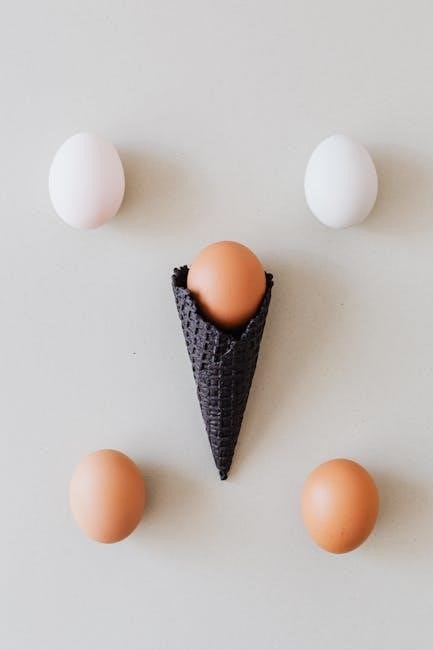
Alternative Cooking Methods
Beyond the stovetop, methods like sous vide, steaming, oven baking, and microwaving offer precision and convenience. Each technique ensures perfectly cooked eggs with unique benefits, such as even doneness and easy peeling. Sous vide provides exact control over yolk firmness, while steaming avoids direct heat, reducing cracking. Oven baking simplifies cooking for large batches, and microwaving offers the fastest results. These alternatives cater to different preferences and kitchen setups, making hard-boiled eggs accessible to everyone. Explore these methods to find your ideal way to achieve perfectly cooked eggs every time. Adjustments in timing and technique ensure desired doneness and texture. Experiment with these methods to discover your favorite approach. Each alternative offers distinct advantages, whether it’s precision, convenience, or ease of preparation. Choose the method that best fits your lifestyle and cooking preferences. Alternative cooking methods expand your options for preparing hard-boiled eggs, ensuring versatility and consistency. Try sous vide for ultimate control or steaming for a gentler process. Oven baking and microwaving provide quick solutions for busy days. These methods ensure perfectly cooked eggs regardless of your chosen technique. Alternative cooking methods offer flexibility and convenience, making hard-boiled eggs a breeze to prepare in any kitchen. From sous vide to microwaving, each method delivers consistent results with minimal effort. Explore these alternatives to enhance your egg-cooking experience. Alternative cooking methods provide innovative ways to prepare hard-boiled eggs, offering precision, speed, and ease. Whether you prefer sous vide or microwaving, these methods ensure perfect eggs. Expand your cooking repertoire with these alternative techniques, designed to simplify the process of making hard-boiled eggs. Alternative cooking methods are perfect for those seeking variety and convenience in their egg preparation. Try these techniques to achieve perfectly cooked eggs every time. Alternative cooking methods offer a modern twist on traditional egg cooking, ensuring delicious and consistent results. Experiment with these techniques to find your new favorite way to make hard-boiled eggs. Alternative cooking methods provide a range of options for preparing hard-boiled eggs, each with its own unique benefits. Discover the method that works best for you. Alternative cooking methods make preparing hard-boiled eggs easier and more efficient, catering to different lifestyles and preferences. Explore these methods to elevate your egg-cooking game. Alternative cooking methods are ideal for those who want to break free from traditional stovetop cooking. Try these innovative techniques for perfect hard-boiled eggs. Alternative cooking methods offer a world of possibilities for hard-boiled egg preparation, ensuring convenience and precision. Find the method that suits your cooking style. Alternative cooking methods are perfect for those looking to diversify their egg-cooking techniques. From sous vide to microwaving, these methods ensure perfectly cooked eggs every time. Alternative cooking methods provide a fresh approach to making hard-boiled eggs, offering ease and consistency. Choose the method that aligns with your preferences. Alternative cooking methods are a great way to explore new ways of preparing hard-boiled eggs, ensuring delicious and consistent results. Try them today! Alternative cooking methods offer a variety of ways to make hard-boiled eggs, each with its own advantages. Experiment to find your preferred technique. Alternative cooking methods are perfect for anyone wanting to try something new when making hard-boiled eggs. Discover the method that works best for you. Alternative cooking methods provide a modern and efficient way to cook hard-boiled eggs, catering to different needs and preferences. Explore these techniques to enhance your cooking. Alternative cooking methods are a fantastic way to prepare hard-boiled eggs with precision and ease. Choose the method that fits your lifestyle. Alternative cooking methods offer a range of options for making hard-boiled eggs, ensuring convenience and delicious results. Find the method that suits you best. Alternative cooking methods are ideal for those who want to try new ways of cooking hard-boiled eggs. Experiment with these techniques for perfect eggs. Alternative cooking methods provide a variety of ways to prepare hard-boiled eggs, ensuring they turn out perfectly every time. Choose your favorite method. Alternative cooking methods are perfect for those seeking a change from traditional egg-cooking techniques. Try these methods for consistent and delicious results. Alternative cooking methods offer a range of innovative ways to make hard-boiled eggs, ensuring ease and precision. Find the method that works for you. Alternative cooking methods are a great way to explore new techniques for making hard-boiled eggs, offering convenience and consistency. Try them today! Alternative cooking methods provide a modern approach to cooking hard-boiled eggs, ensuring they are prepared to your liking. Explore these methods to find your favorite. Alternative cooking methods are perfect for anyone wanting to try something new when making hard-boiled eggs. Discover the method that suits your needs. Alternative cooking methods offer a variety of ways to cook hard-boiled eggs, each with its own unique benefits. Choose the one that works best for you. Alternative cooking methods are ideal for those looking to diversify their egg-cooking techniques. From sous vide to microwaving, these methods ensure perfect results. Alternative cooking methods provide a range of options for making hard-boiled eggs, ensuring they are cooked to your desired doneness. Try these techniques. Alternative cooking methods are a fantastic way to prepare hard-boiled eggs with precision and ease. Explore these methods to find your new favorite approach. Alternative cooking methods offer a fresh perspective on cooking hard-boiled eggs, ensuring they are both delicious and consistently cooked. Experiment with these techniques. Alternative cooking methods are perfect for those seeking a modern twist on traditional egg cooking. Try these methods for perfect hard-boiled eggs. Alternative cooking methods provide a variety of ways to cook hard-boiled eggs, ensuring they are prepared to your liking every time. Explore these methods. Alternative cooking methods are ideal for anyone looking to try new techniques for making hard-boiled eggs. Find the method that works best for you. Alternative cooking methods offer a range of innovative ways to prepare hard-boiled eggs, ensuring convenience and precision. Try these techniques today. Alternative cooking methods are a great way to explore new ways of cooking hard-boiled eggs, offering consistent and delicious results. Choose your preferred method. Alternative cooking methods provide a modern and efficient way to make hard-boiled eggs, catering to different preferences and lifestyles. Explore these techniques. Alternative cooking methods are perfect for those wanting to break free from traditional egg-cooking methods. Try these alternative techniques for perfect eggs. Alternative cooking methods offer a variety of ways to cook hard-boiled eggs, ensuring they are perfectly cooked every time. Discover your favorite method. Alternative cooking methods are ideal for those seeking a change from conventional egg-cooking techniques. Experiment with these methods for consistent results. Alternative cooking methods provide a range of options for preparing hard-boiled eggs, ensuring they are cooked to your desired level of doneness. Try them. Alternative cooking methods are a fantastic way to make hard-boiled eggs with precision and ease, offering a modern twist on traditional cooking. Explore these techniques. Alternative cooking methods offer a fresh approach to cooking hard-boiled eggs, ensuring they are both delicious and consistently prepared. Choose your preferred method. Alternative cooking methods are perfect for anyone wanting to try something new when making hard-boiled eggs. Find the method that suits your preferences. Alternative cooking methods provide a variety of ways to prepare hard-boiled eggs, ensuring they turn out perfectly every time. Explore these methods. Alternative cooking methods are ideal for those looking to try new techniques for making hard-boiled eggs. Discover the method that works best for you. Alternative cooking methods offer a range of innovative ways to cook hard-boiled eggs, ensuring convenience and precision. Try these methods today. Alternative cooking methods are a great way to explore new techniques for making hard-boiled eggs, offering consistent and delicious results. Choose your favorite method. Alternative cooking methods provide a modern and efficient way to prepare hard-boiled eggs, catering to different needs and preferences. Explore these techniques. Alternative cooking methods are perfect for those wanting to try something new when making hard-boiled eggs. Experiment with these methods for perfect eggs. Alternative cooking methods offer a variety of ways to cook hard-boiled eggs, ensuring they are perfectly cooked every time. Find your preferred method. Alternative cooking methods are ideal for those seeking a change from traditional egg-cooking techniques. Try these methods for consistent and delicious results. Alternative cooking methods provide a range of options for making hard-boiled eggs, ensuring they are cooked to your desired doneness. Explore these techniques. Alternative cooking methods are a fantastic way to prepare hard-boiled eggs with precision and ease, offering a modern twist on traditional cooking. Try them. Alternative cooking methods offer a fresh
Sous Vide Method
For precision cooking, the sous vide method ensures perfectly cooked eggs. Place eggs on a trivet in a water bath with 1 cup of water. Cook on high pressure for 4 to 5 minutes for classic hard-boiled eggs. After cooking, allow a 5-minute natural release before transferring to an ice bath. This method offers exact control over doneness, resulting in consistent texture and flavor. Sous vide eggs are easy to peel and boast vibrant, even yolks without any green rings. It’s an ideal technique for achieving uniform results, especially for large batches or specific preferences.
Steaming Method
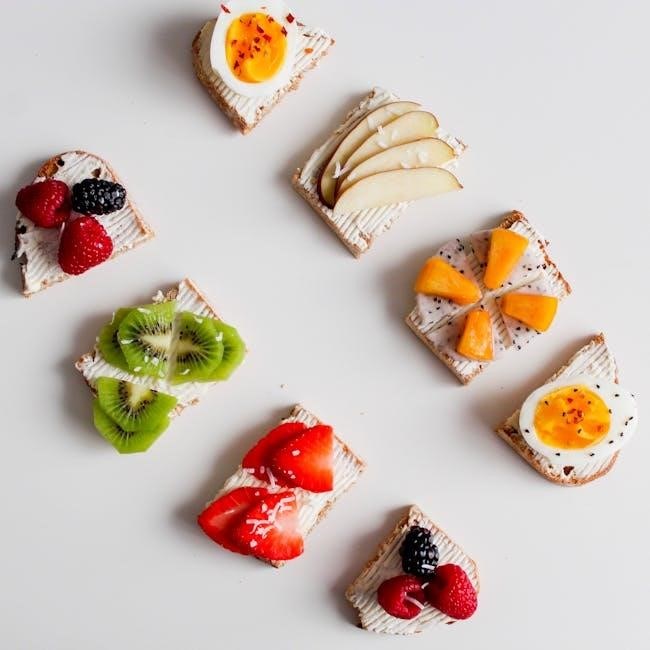
Steaming is a gentle and effective way to cook hard-boiled eggs. Place eggs in a steamer basket over boiling water, ensuring they are not submerged. Steam for 12 minutes for fully set yolks and whites. This method prevents overcooking and helps maintain a tender texture. Once done, immediately transfer the eggs to an ice bath to stop cooking. Steaming is ideal for achieving consistent results without direct heat exposure. It also reduces the risk of rubbery egg whites, making it a great alternative to traditional boiling. This technique ensures easy peeling and vibrant, evenly cooked yolks every time.
Oven Baking Method
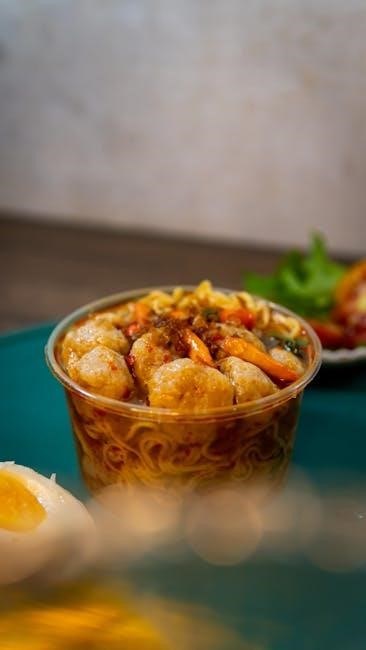
Oven baking is a hands-off approach to cooking eggs. Preheat your oven to 350°F (175°C). Place eggs in a muffin tin, ensuring each egg is in a separate cup. Bake for 30 minutes for hard-boiled eggs. This method avoids the risk of cracking on the stovetop and allows for even cooking. Once baked, transfer eggs to an ice bath to cool. The oven method is perfect for cooking multiple eggs at once. It also ensures the whites and yolks are fully set without overcooking. This technique is great for meal prep and offers a convenient alternative to traditional boiling.
Microwave Method
Cooking hard-boiled eggs in the microwave is quick and efficient. Place eggs in a microwave-safe container, add enough water to cover them, and cover the container with a lid or microwave-safe plastic wrap. Cook on high for 3-4 minutes for soft-boiled eggs and 5-6 minutes for hard-boiled eggs. After cooking, immediately transfer the eggs to an ice bath to stop the cooking process. This method is ideal for small batches and requires minimal cleanup. Ensure the container is microwave-safe to avoid any risk of explosion or damage. Cooking times may vary based on microwave power levels, so adjust accordingly for desired doneness.
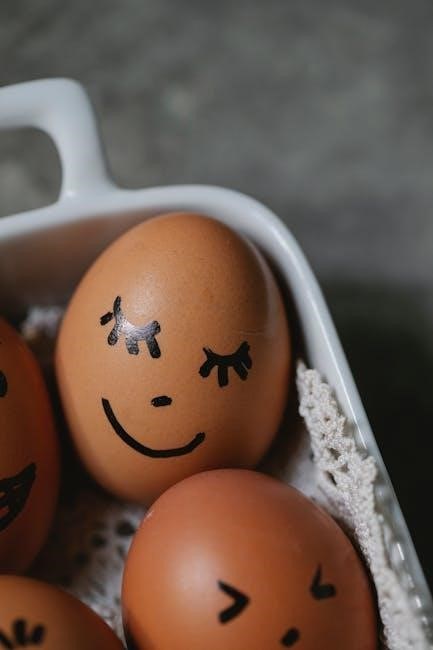
Cooking Time and Doneness
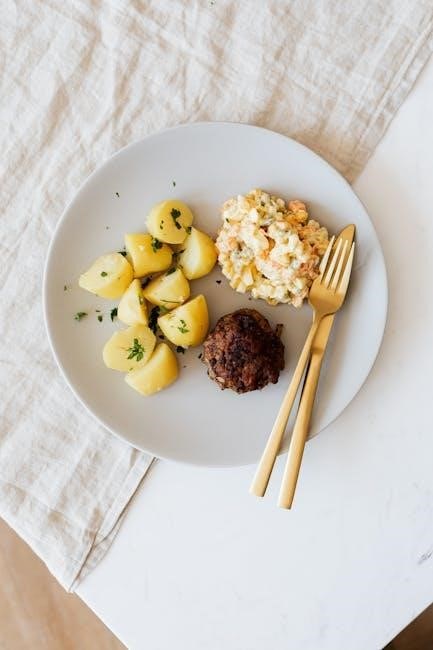
Cooking time determines doneness: 6 minutes for runny yolks, 8 minutes for soft-boiled, 10 minutes for hard-boiled, and 12 minutes for fully firm yolks.
6 Minutes for Runny Yolks
Cooking eggs for 6 minutes results in runny yolks, perfect for those who enjoy a creamy, molten center. The whites will be fully set while the yolks remain liquid. This method is ideal for dishes like ramen or Eggs Benedict, where the yolk’s richness enhances flavors. To achieve this, bring eggs to a boil, cover, and let stand for 6 minutes. Immediately transfer to an ice bath to stop cooking. The runny yolk adds a velvety texture, making it a favorite for many. This timing ensures a delicate balance between doneness and yolk fluidity.
8 Minutes for Soft-Boiled Eggs
Cooking eggs for 8 minutes yields soft-boiled eggs with slightly firmer yolks than the runny 6-minute version. The whites are fully set, while the yolks retain a creamy, spreadable consistency. This texture is perfect for dipping toast or as a topping for salads. To achieve this, place eggs in boiling water, cover, and let stand for 8 minutes before transferring to an ice bath. The soft yolk offers a balance between liquidity and firmness, making it a versatile option for various recipes and a delightful snack on its own.
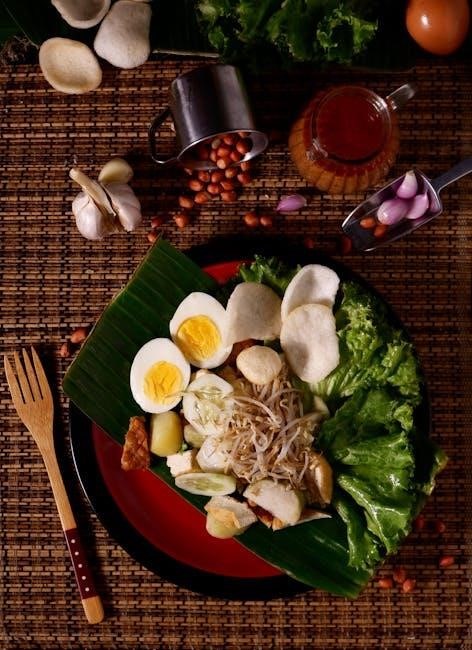
Additional Resources
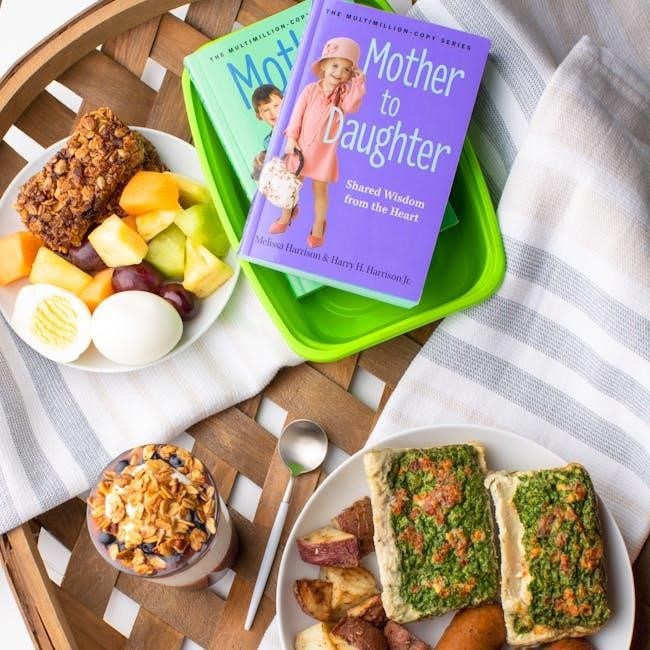
10 Minutes for Hard-Boiled Eggs
Cooking eggs for 10 minutes results in fully set, hard-boiled eggs with firm whites and yolks. This method is ideal for snacking, salads, or deviled eggs. After boiling, immediately transfer the eggs to an ice bath to stop cooking and make peeling easier. The yolk will be completely solid with a light yellow color, offering a clean, savory flavor. This cooking time ensures the eggs are fully cooked through, making them a convenient and protein-packed addition to any meal or snack, perfect for those who prefer a classic, fully set texture.
